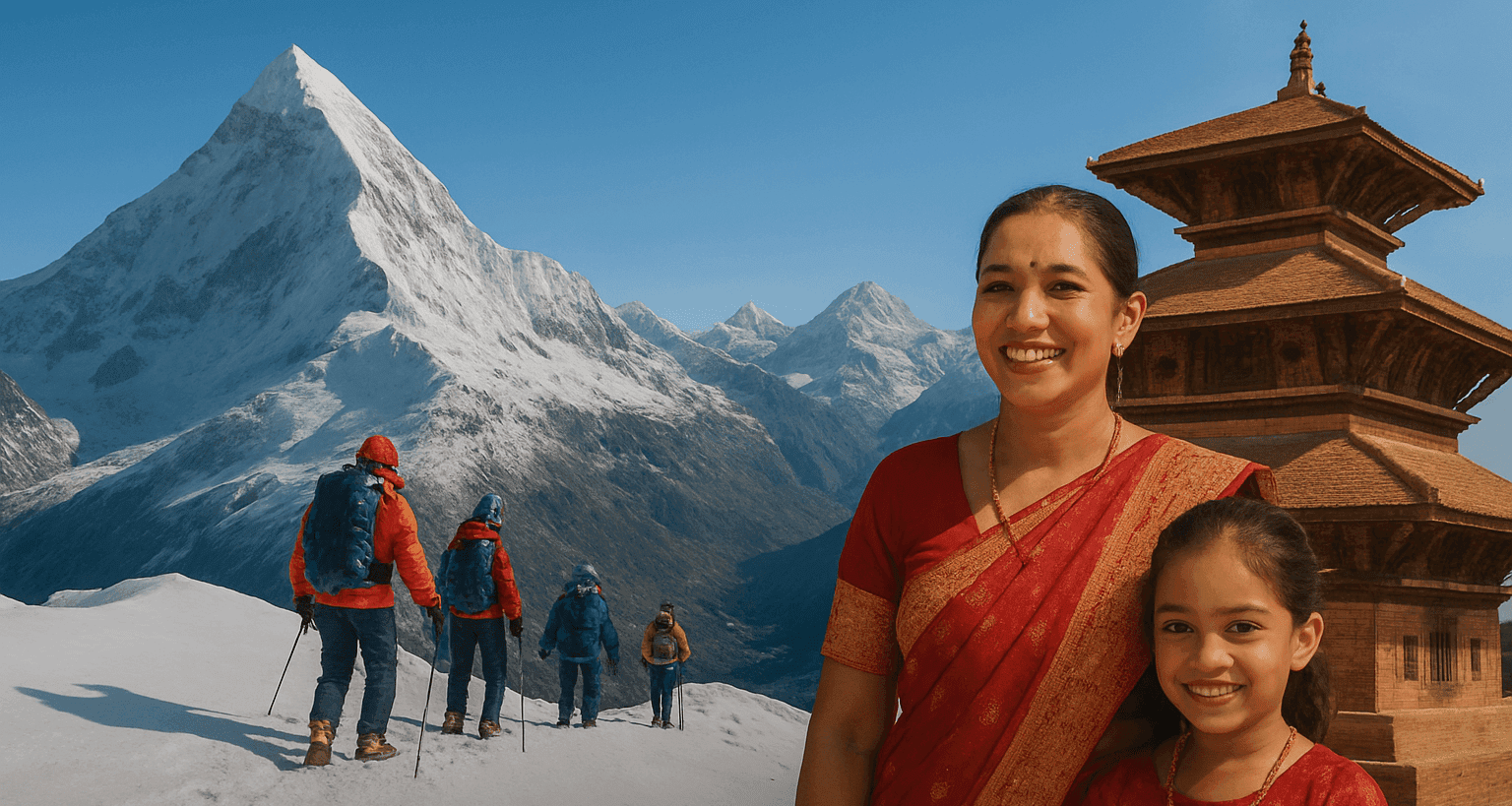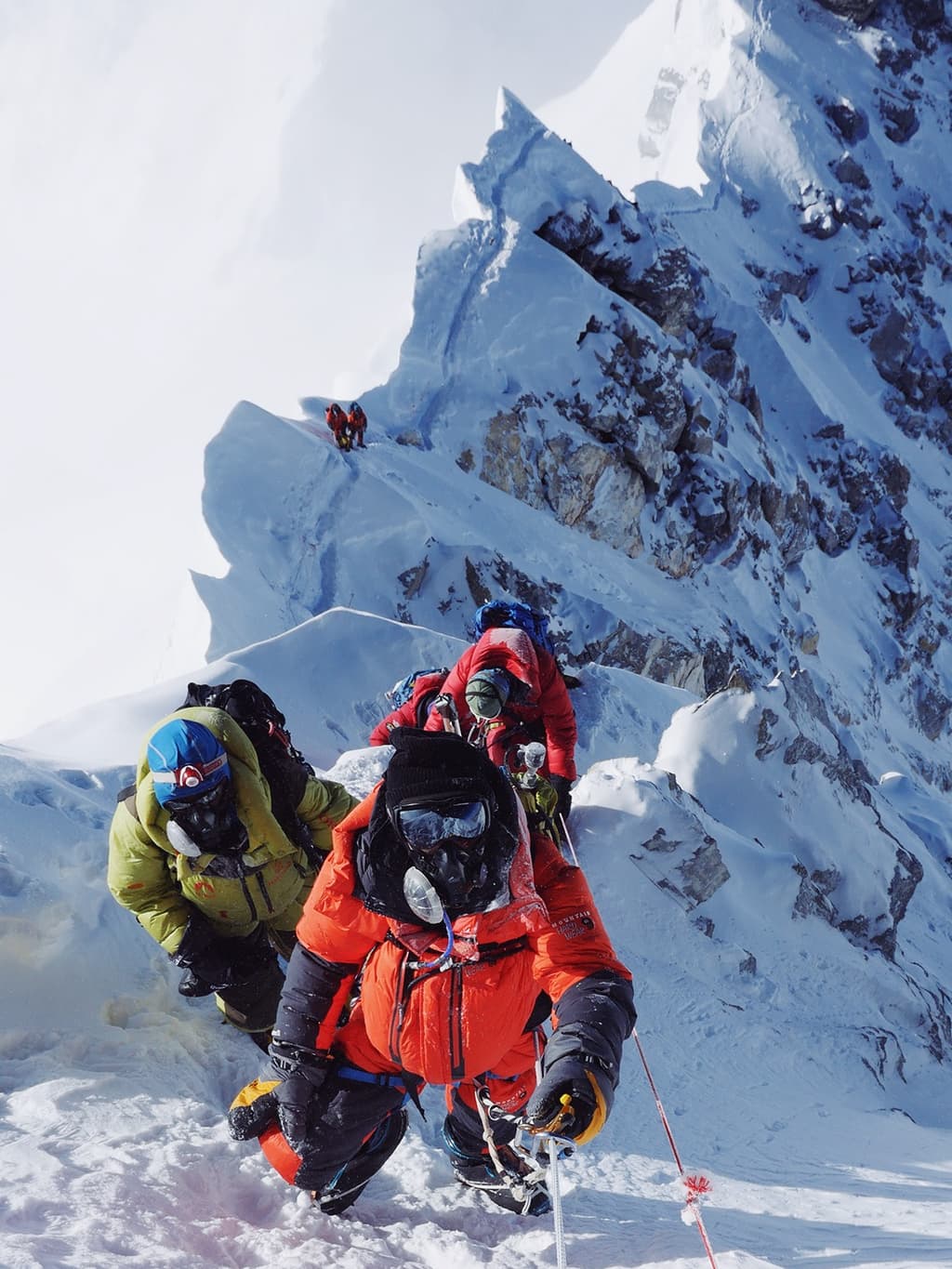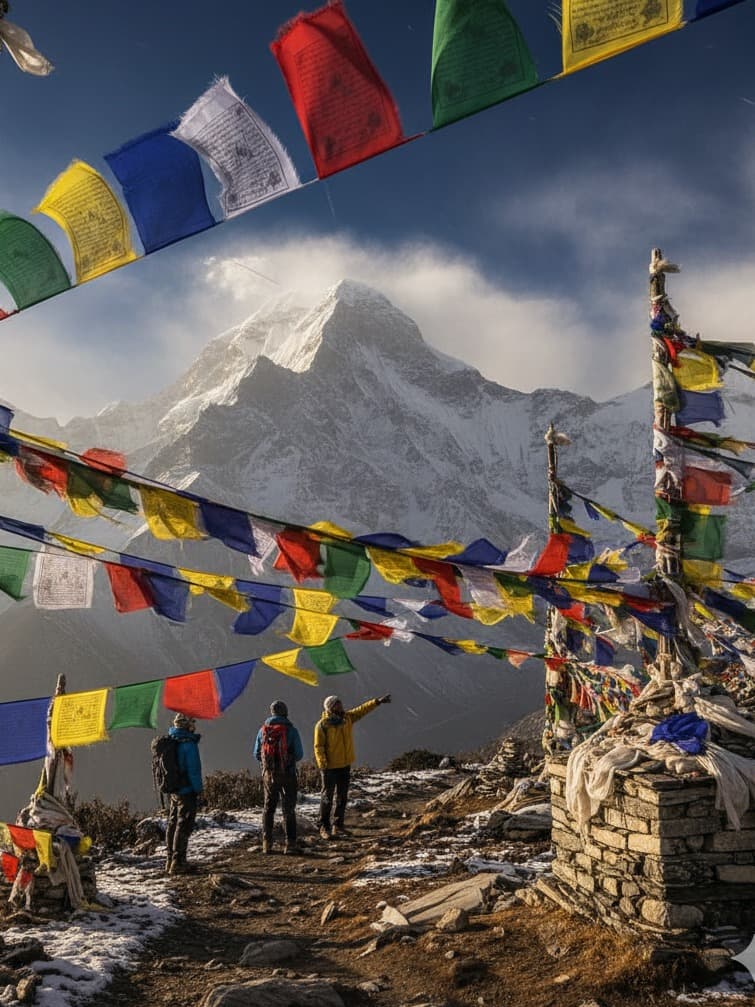For adventurers seeking a blend of thrilling mountain climbing and authentic cultural immersion, Everest Sherpa Expeditions Pvt. Ltd. offers the perfect combination of high-altitude excitement and Nepali heritage exploration. This comprehensive adventure package combines the technical challenge of summiting Island Peak (6,189m) with rich cultural experiences in the Sherpa villages of the Khumbu Valley.
Starting with a scenic flight to Lukla, you'll journey through iconic villages like Namche Bazaar and Tengboche, visit ancient monasteries, and experience traditional Sherpa hospitality before tackling the technical ascent of Island Peak. Our itinerary balances acclimatization days with cultural exploration, ensuring both safety and an enriching experience.
In this guide, we'll cover the detailed day-by-day itinerary, including cultural highlights, technical climbing requirements with professional Sherpa support, and complete package inclusions from permits to equipment preparation. Whether you're a trekking enthusiast looking for your first mountaineering experience or a seasoned climber wanting cultural depth, this integrated adventure delivers the best of Nepal's mountains and heritage.
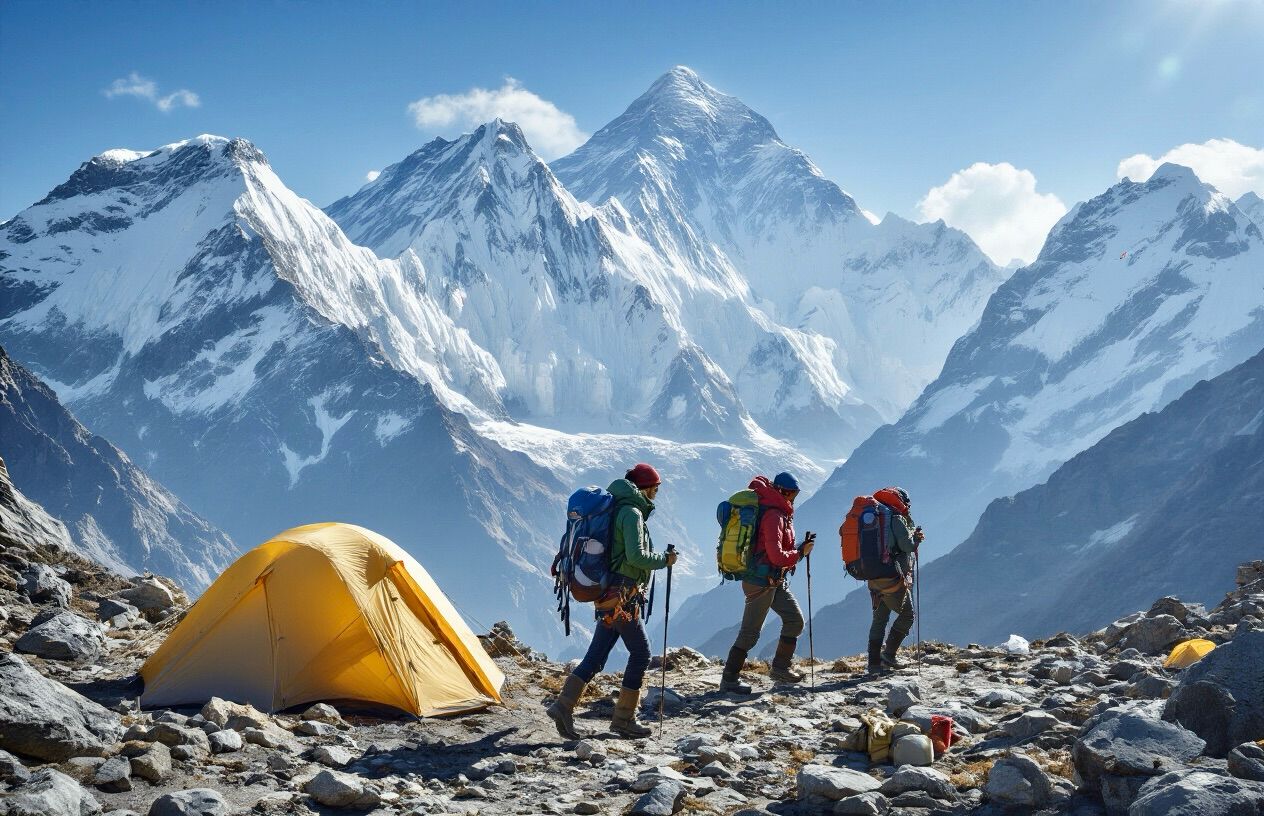
Complete Adventure Package Overview - Island Peak with Cultural Immersion
Epic 18-21 Day Himalayan Journey Combining Trekking and Mountaineering
The Island Peak climbing adventure via the Everest Base Camp Trek represents an extraordinary opportunity to experience the best of Nepal's Himalayan wonders. Meticulously crafted by Everest Sherpa Expeditions Pvt. Ltd., this comprehensive 18-21-day journey takes you through the breathtaking landscapes of the Khumbu Valley. This carefully designed expedition balances challenging high-altitude trekking with an authentic cultural immersion experience, allowing adventurers to connect with the unique heritage of Nepal's mountain communities while pursuing their summit aspirations.
Technical Climbing Challenge at 6,189 Meters with Cultural Discovery
Island Peak, standing majestically at 6,189 meters, presents the perfect blend of technical climbing challenge and cultural discovery. The expedition is structured to provide trekkers with opportunities to visit ancient monasteries, experience traditional Sherpa hospitality, and participate in local customs, all while preparing for the exhilarating summit attempt. This thoughtful integration of cultural experiences enriches the mountaineering journey, creating a more meaningful connection with the Himalayan landscape and its people.
Professional Guidance by Everest Sherpa Expeditions Pvt. Ltd.
The expertise of Everest Sherpa Expeditions Pvt. Ltd. ensures that every aspect of this adventure is managed with the highest standards of professionalism and safety. Their team of experienced Sherpa guides brings generations of local knowledge and climbing expertise to the expedition. This professional guidance is essential for navigating both the physical challenges of high-altitude mountaineering and the cultural nuances encountered throughout the journey in the Khumbu region.
Maximum Altitude Achievement with Panoramic Himalayan Views
The Island Peak summit rewards climbers with some of the most spectacular panoramic views in the Himalayas. From this vantage point at 6,189 meters, adventurers gain a profound perspective of the surrounding giants, including Mount Everest, Lhotse, Nuptse, and Makalu. This achievement represents more than just reaching a physical peak—it offers a moment of personal triumph set against the backdrop of the world's most impressive mountain range, creating memories that will last a lifetime.
Detailed Itinerary and Route Planning
Kathmandu to Lukla Flight and Trek Commencement
Your adventure begins in Kathmandu, Nepal's vibrant capital, where you'll board a scenic flight to Lukla. This exhilarating 35-minute journey offers spectacular views of the Himalayan range before landing at Lukla's mountain airstrip (2,860m). Upon arrival, you'll meet your trekking team and begin your journey on foot, officially commencing your combined cultural and climbing expedition through the legendary Khumbu region.
Cultural Village Exploration Through Namche Bazaar and Tengboche
From Lukla, the trail leads through charming Sherpa villages, providing immersive cultural experiences. Namche Bazaar, the bustling gateway to Everest, offers your first major cultural stop where you'll spend time acclimatizing while exploring local markets and museums. Continuing onward, you'll reach Tengboche, home to the region's most important Buddhist monastery, where you can witness traditional prayer ceremonies and experience authentic Sherpa spiritual practices against the backdrop of Everest and Ama Dablam.
Everest Base Camp Trek with Kala Patthar Summit
The journey continues toward Everest Base Camp, passing through Dingboche and Lobuche as you gradually gain altitude. Upon reaching Everest Base Camp (5,364m), you'll experience the historic starting point for Everest summit expeditions. The itinerary then includes a pre-dawn hike to Kala Patthar (5,550m), offering the most spectacular panoramic views of Everest, Nuptse, Lhotse, and surrounding peaks – a photographer's paradise and a highlight of the cultural portion of your journey.
Acclimatization Strategy in Dingboche and Chhukung
Strategic acclimatization days are built into your itinerary at Dingboche and Chhukung. These rest days are crucial for proper adaptation to high altitude and include short hikes to higher elevations followed by descents to sleeping altitude. During your stay in Chhukung, you'll receive preliminary training and orientation for the technical climbing portion of your journey, ensuring you're well-prepared both physically and mentally for the challenges ahead.
Island Peak Base Camp Approach and Summit Attempt
From Chhukung, you'll approach Island Peak Base Camp, where specialized climbing training will be conducted. Your guides will provide comprehensive instruction on climbing techniques, including rope work, crampon use, and proper ice axe handling. After a pre-summit rest day, you'll begin your summit push in the early hours of the morning, navigating glaciers and a moderately steep headwall before reaching the exhilarating knife-edge ridge that leads to the summit at 6,189m. Following your summit success, you'll descend via Tengboche, eventually returning to Lukla for your flight back to Kathmandu, completing your extraordinary journey that perfectly combines high-altitude adventure with cultural immersion.
Cultural Heritage and Spiritual Experiences
Sherpa Village Immersion with Traditional Hospitality
The journey to Island Peak offers far more than just a climbing adventure—it's an opportunity to immerse yourself in the rich tapestry of Sherpa culture. As you trek through remote mountain villages, you'll experience firsthand the legendary hospitality of Sherpa communities. Local families welcome trekkers with warm smiles, offering traditional butter tea and authentic meals prepared using age-old recipes passed down through generations. These intimate interactions provide a genuine glimpse into daily mountain life that few tourists experience.
Tengboche Monastery Visit and Mountain Spirituality
A highlight of this cultural journey is the visit to the iconic Tengboche Monastery. Perched at 3,867 meters, this sacred Buddhist monastery serves as the spiritual center of the Khumbu region. Here, you can witness morning or evening prayer ceremonies where monks chant ancient mantras against the backdrop of fluttering prayer flags. The monastery offers not only spiritual enrichment but also breathtaking panoramic views of the Himalayan giants, including Everest, Lhotse, and Ama Dablam. Many trekkers find this spiritual experience provides a profound connection to the mountains they're about to climb.
Local Community Interaction and Cultural Learning
Throughout your journey, meaningful interactions with local communities create lasting memories. You'll have opportunities to learn about traditional Sherpa customs, beliefs, and their harmonious relationship with the mountains. Many villages host cultural performances featuring traditional music and dance, offering insights into local folklore and religious practices. These exchanges foster mutual respect and understanding while supporting local economies through sustainable tourism.
UNESCO World Heritage Sagarmatha National Park Exploration
Your cultural expedition includes traversing the magnificent Sagarmatha National Park, a UNESCO World Heritage site. Beyond its stunning natural beauty, the park represents the Sherpa people's deep connection to their environment. Local guides share knowledge about indigenous plant species, wildlife conservation efforts, and the delicate balance between human habitation and nature preservation. The park's diverse flora and fauna reflect centuries of ecological wisdom preserved by local communities, making your journey both culturally enriching and environmentally enlightening.
Technical Climbing Requirements and Training
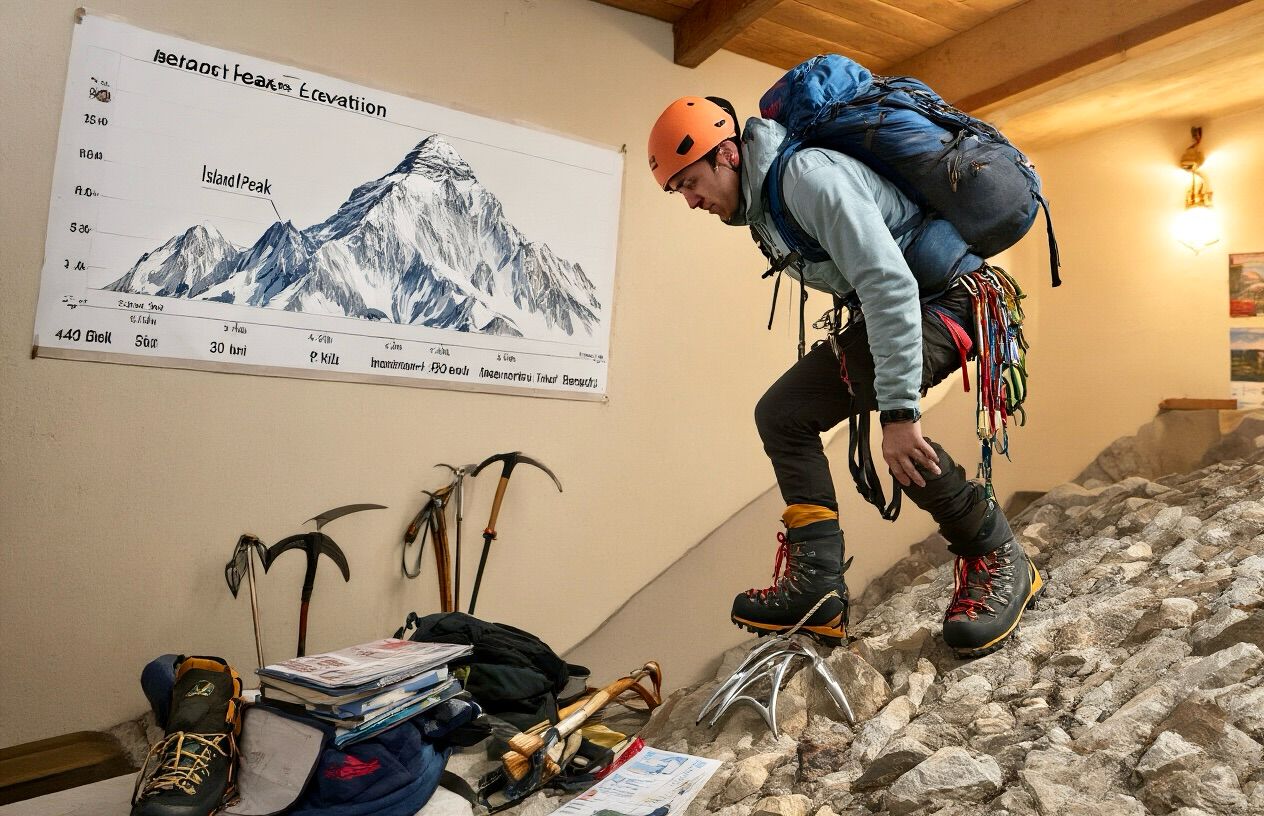
Island Peak combines trekking with technical climbing, requiring specific mountaineering skills to ensure both safety and success. While accessible to beginners with proper preparation, understanding the technical requirements is essential before attempting this adventure.
Essential Mountaineering Skills Development
The successful ascent of Island Peak demands proficiency in fundamental mountaineering techniques. Climbers must develop competence in:
- Crampon use: Proper foot placement and movement techniques on icy terrain
- Ice axe handling: Both for balance and self-arrest in case of a slip
- Rope techniques: Understanding basic knots, belaying, and rope management
These skills form the foundation of your climbing toolkit and are critical for navigating the challenging sections of Island Peak. With proper training, even those new to mountaineering can acquire these abilities during preparatory sessions.
Glacier Travel and Crevasse Navigation Techniques
Island Peak's route traverses glacier terrain, presenting unique challenges that require specific skills:
- Recognizing potentially dangerous crevasse zones
- Understanding rope team formation and movement
- Maintaining proper spacing between team members
- Reading glacier features to identify the safest passage
Being comfortable with glacier travel is non-negotiable for Island Peak climbers. The ability to recognize hazards and move efficiently across this terrain significantly impacts both safety and summit success.
Fixed Rope and Ice Climbing Preparation
The steeper sections of Island Peak require:
- Ascending and descending fixed ropes using mechanical ascenders and figure-8 descenders
- Proper weight distribution on steep snow and ice slopes
- Effective communication with climbing partners and guides
- Energy conservation techniques during technical climbing sections
These more advanced skills build upon the foundational techniques and are crucial for the final push to the summit, where the terrain becomes considerably more challenging.
Success Rate Optimization with Professional Training
With proper preparation and professional guidance, Island Peak boasts an impressive 80-85% success rate. To maximize your chances:
- Participate in pre-climb training sessions offered by experienced guides
- Practice skills repeatedly until they become second nature
- Focus on the efficiency of movement to conserve energy
- Listen carefully to the guide's instructions during the climb
The technical aspects of Island Peak are entirely learnable with dedicated training. Even those with no prior mountaineering experience can develop the necessary skills through focused preparation, making this peak an excellent introduction to Himalayan climbing while complementing the cultural experiences of your Nepal journey.
Optimal Timing and Weather Conditions
Best Seasons - Spring and Autumn Climbing Windows
When planning your Island Peak climbing adventure combined with cultural tours, timing is crucial for success and enjoyment. The optimal climbing windows fall within two distinct seasons: Spring (March-May) and Autumn (September-November). These periods offer the most favorable conditions for both the technical climbing portions and cultural exploration components of your journey.
During these seasons, you'll experience stable weather patterns that create ideal climbing conditions on Island Peak while also allowing comfortable travel through Nepal's cultural sites. The trails remain dry and accessible, making your journey from cultural centers to the mountain base more predictable and enjoyable.
October Premium Conditions with Clear Visibility
Among all months, October stands out as the premium period for your Island Peak expedition. This month represents the pinnacle of the Autumn climbing season, characterized by exceptionally stable weather conditions, crystal-clear skies, and superior visibility across the Himalayan range. These factors combine to create what many experienced climbers consider the absolute peak trekking and climbing season in Nepal.
The exceptional visibility during October allows for breathtaking views throughout your journey, from cultural heritage sites to panoramic mountain vistas. Daytime temperatures during October typically range from 10°C to 15°C at lower elevations, providing comfortable conditions for both trekking and cultural exploration activities.
Weather Stability and Temperature Management
Weather stability during the recommended seasons significantly reduces climbing risks and increases summit success rates. During optimal climbing windows, precipitation levels remain minimal, ensuring dry trails and climbing routes. This stability allows for more predictable acclimatization schedules and summit attempts.
Temperature management becomes more straightforward during these periods as well. While higher altitudes will always present cooler conditions, the recommended seasons offer manageable temperature ranges that most climbers can comfortably handle with proper gear. The moderate daytime temperatures at lower elevations create comfortable conditions for the cultural components of your journey.
Avoiding Monsoon and Winter Challenges
For safety and comfort reasons, we strongly advise against attempting Island Peak during the Monsoon (June-August) or Winter (December-February). These seasons present significant challenges that can compromise both safety and enjoyment.
The Monsoon season brings heavy rainfall, which creates slippery trails, reduced visibility, and increased risk of landslides during the trekking portions. These conditions not only impact climbing safety but also diminish the cultural experience as many sites become difficult to access or appreciate fully in poor weather.
Winter attempts face bitter cold temperatures, especially at higher elevations, which dramatically increase the technical difficulty of the climb and the risk of cold-related injuries. Additionally, many cultural sites and villages may be less accessible during winter months, limiting the comprehensive experience we aim to provide in our combined Island Peak and cultural immersion packages.
Complete Cost Breakdown and Package Inclusions
Comprehensive Pricing from $2,500-$4,500 USD Per Person
When planning your Island Peak expedition with cultural tours in Nepal, you can expect a price range of $2,500 to $4,500 USD per person for a fully guided package. This pricing varies based on the duration of your trip, the level of service, and any customizations you might request. The comprehensive pricing structure ensures you receive excellent value while experiencing both the thrill of climbing and the cultural richness of Nepal.
All-Inclusive Services - Permits, Guides, Equipment, Accommodation
Our packages are designed to be truly all-inclusive, covering all necessary permits required for Island Peak climbing and cultural site visits. Expert guides are provided throughout your journey, with guide fees typically ranging from USD 20 to USD 50 per day depending on experience level and certification. All climbing gear needed for a successful summit attempt is included, eliminating the need to purchase or rent specialized equipment separately. Comfortable accommodation during the entire trek is arranged for you, from teahouses along the trekking routes to hotels in cultural centers.
Domestic Flights and Professional Porter Support
All domestic flights within Nepal are included in your package price, ensuring seamless transportation between destinations. Professional porter support is a key component of your expedition, with porters carrying the bulk of your equipment and supplies. Porter fees typically range from USD 15 to USD 25 per day, allowing you to trek comfortably with just a day pack while enjoying the scenery and cultural experiences.
Insurance, Rescue Services, and Safety Provisions
Your safety is our priority, which is why all packages include comprehensive insurance coverage during your expedition. Emergency rescue services are arranged as part of your package, providing peace of mind as you tackle challenging terrain. All meals during the trek and climbing periods are included, ensuring proper nutrition for optimal performance. As a special touch, your cultural tour package also includes guided sightseeing at key cultural sites and a farewell dinner to celebrate your accomplishments before departure.
Essential Permits and Legal Requirements
Exploring Island Peak while immersing yourself in Nepal's cultural heritage requires proper documentation and adherence to local regulations. Understanding the permit requirements is crucial for a smooth expedition experience.
Sagarmatha National Park Entry Documentation
Before embarking on your Island Peak adventure, you must obtain the Sagarmatha National Park Entry Permit. This essential document grants you legal access to one of the world's most spectacular protected areas, home to Mount Everest and numerous other Himalayan peaks. The permit helps conservation efforts by regulating visitor numbers and generating funds for environmental protection initiatives within the park.
Nepal Mountaineering Association Climbing Permit
For the climbing portion of your journey, the Nepal Mountaineering Association (NMA) Permit is mandatory. Island Peak (Imja Tse) is classified as a "trekking peak," requiring this specific permit for all climbers attempting to reach its summit. The NMA permit ensures that climbers are registered officially and follow established safety and environmental protocols during their expedition.
Local Municipality and TIMS Registration
In addition to national permits, you'll need:
- Khumbu Pasang Lhamu Rural Municipality Permit: A local permit supporting community development in the Everest region
- TIMS Card (Trekker's Information Management System): This registration system helps track trekkers for safety purposes and is essential for anyone trekking in Nepal's mountains
Complete Administrative Support by Everest Sherpa Expeditions
When booking with Everest Sherpa Expeditions Pvt. Ltd., you benefit from comprehensive administrative support throughout your journey. Our team:
- Handles all necessary paperwork and permit applications
- Ensures full compliance with local regulations and requirements
- Includes permit costs within your package price
- Manages the complex logistics of obtaining multiple permits
- Provides documentation guidance before and during your expedition
This complete administrative support allows you to focus entirely on your preparation and enjoyment of the cultural and climbing experiences rather than navigating the bureaucratic requirements independently.
Gear Requirements and Equipment Preparation
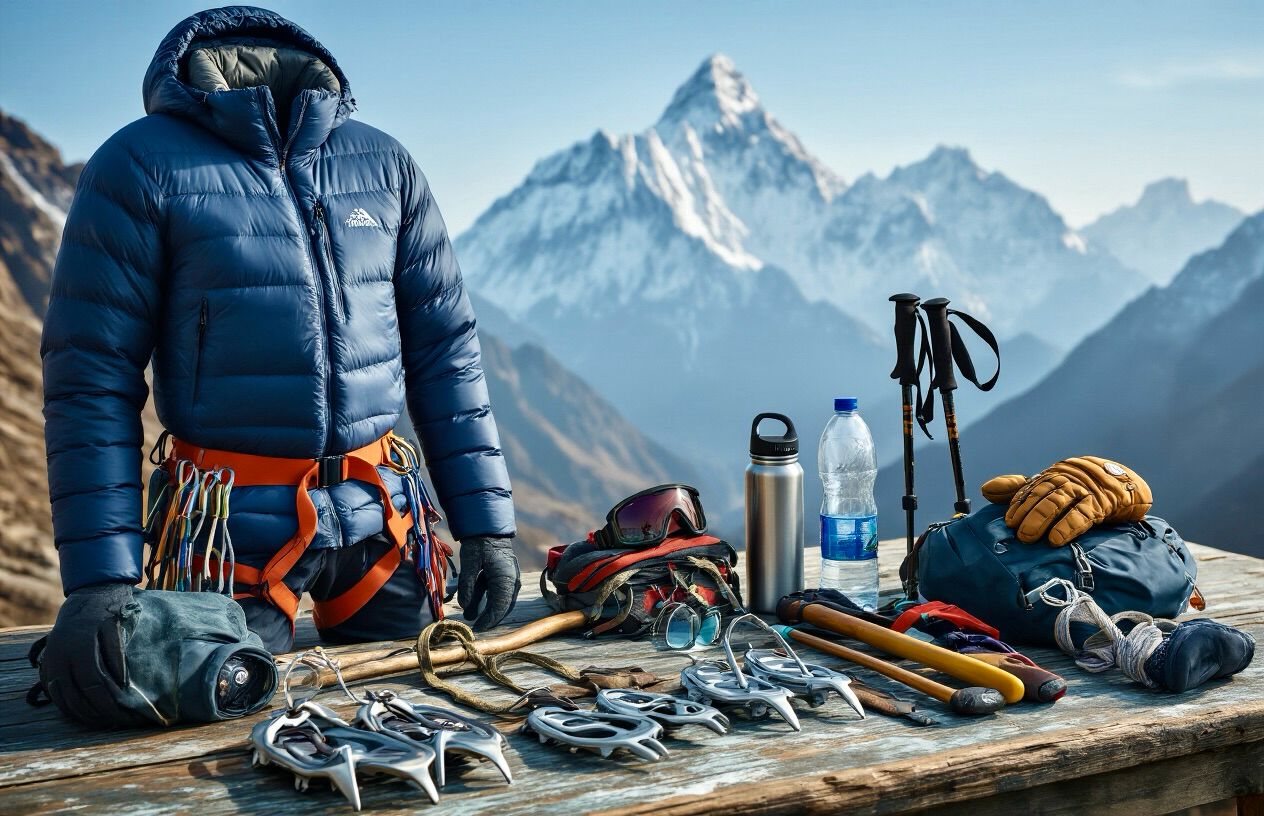
Technical Climbing Equipment - Crampons, Ice Axes, Harnesses
Proper technical equipment is essential for your Island Peak climbing adventure. You'll need to prepare several key items to ensure safety and success on the mountain:
- Trekking Boots: Sturdy, insulated mountaineering boots that can accommodate crampons
- Crampons: Metal traction devices that attach to your boots for grip on ice and snow
- Ice Axe: Critical for balance, self-arrest, and navigating steep terrain
- Harness: A climbing harness that fits comfortably over multiple layers
- Helmet: To protect against falling ice or rock debris
- Ropes: While often provided by guides, familiarity with climbing ropes is important
High-Altitude Clothing and Thermal Protection Systems
Layering is the key strategy for managing body temperature at high altitudes where conditions can change rapidly:
- Base Layers: Moisture-wicking fabrics that pull sweat away from your skin
- Mid Layers: Insulating materials like fleece or down to trap body heat
- Outer Shells: Waterproof and windproof jackets and pants to protect against extreme elements
- Gloves: Both liner gloves and insulated waterproof mittens or gloves
- Hats: A Warm hat for cold conditions and a sun hat for protection during the daytime
Safety Equipment and Personal Emergency Supplies
Being prepared for emergencies is crucial when combining Island Peak climbing with cultural tours:
- First Aid Kit: Basic supplies including bandages, antiseptics, and pain relievers
- Altitude Sickness Medications: Consult your doctor for appropriate prescriptions
- Water Bottles: Insulated bottles and/or hydration systems
- Sunglasses: High-quality glacier glasses with UV protection
- Sun Protection: High SPF sunscreen and lip balm
- Headlamp: With extra batteries for early morning climbs and emergencies
- Trekking Poles: For stability during the approach trek
Equipment Rental Options in Kathmandu Thamel
For those not wanting to purchase or transport specialized climbing gear, Kathmandu's Thamel district offers numerous rental options:
- Multiple mountaineering shops provide quality rental equipment
- Technical climbing gear, including crampons, ice axes, and harnesses, can be rented at reasonable rates
- Rental shops in Thamel typically offer package deals specifically for Island Peak climbers
- Equipment quality varies between shops, so inspect all items carefully before renting
- Consider booking rentals in advance during peak climbing seasons
Physical Preparation and Training Protocols
Cardiovascular Fitness and Endurance Building
Physical preparation for Island Peak climbing begins with developing strong cardiovascular fitness. Focus on incorporating regular aerobic exercises into your training routine, including hiking, running, cycling, and swimming. These activities help build the stamina required for long days of trekking and climbing at high altitudes.
For optimal results, gradually increase the duration and intensity of your workouts over several months before your expedition. Additionally, incorporate strength training exercises specifically targeting your legs and core, as these muscle groups will bear the brunt of the climbing effort.
A critical component of your training should include long-distance hikes while carrying a loaded backpack. This simulates the actual conditions you'll experience during your trek and climb, preparing your body for the physical demands ahead.
Basic Mountaineering Skills Development Program
With a solid fitness foundation, you'll need to develop essential mountaineering skills before tackling Island Peak. These skills include proper crampon use for navigating icy terrain, ice axe handling for stability and self-arrest, and rope techniques for safe glacier travel and climbing.
Our training program provides comprehensive instruction in these fundamental techniques, ensuring you're well-prepared for the technical aspects of the climb. These skills not only enhance your climbing ability but also significantly contribute to your safety on the mountain.
Altitude Acclimatization and Health Preparation
Altitude acclimatization is perhaps the most crucial aspect of your preparation. Our itinerary incorporates a gradual ascent profile, allowing your body to adapt to decreasing oxygen levels as you gain elevation.
Proper hydration and nutrition play vital roles in successful acclimatization. We emphasize drinking plenty of water and maintaining a balanced diet rich in carbohydrates during the trek. Additionally, you'll learn to recognize symptoms of altitude sickness, including headaches, nausea, and difficulty sleeping, enabling early intervention if problems arise.
Pre-Climb Training and Technical Briefings
Before attempting Island Peak, you'll participate in specialized pre-climb training sessions conducted by our experienced climbing guides. These sessions reinforce the mountaineering skills introduced earlier and provide detailed technical briefings specific to the conditions you'll encounter on Island Peak.
These briefings cover safety protocols, communication systems, and emergency procedures to ensure you're fully prepared for the climb. Our team will also conduct equipment checks, verifying that all your gear is properly fitted and functioning correctly before the summit attempt.
Safety Measures and Risk Management
Experienced Sherpa Guide Leadership and Support
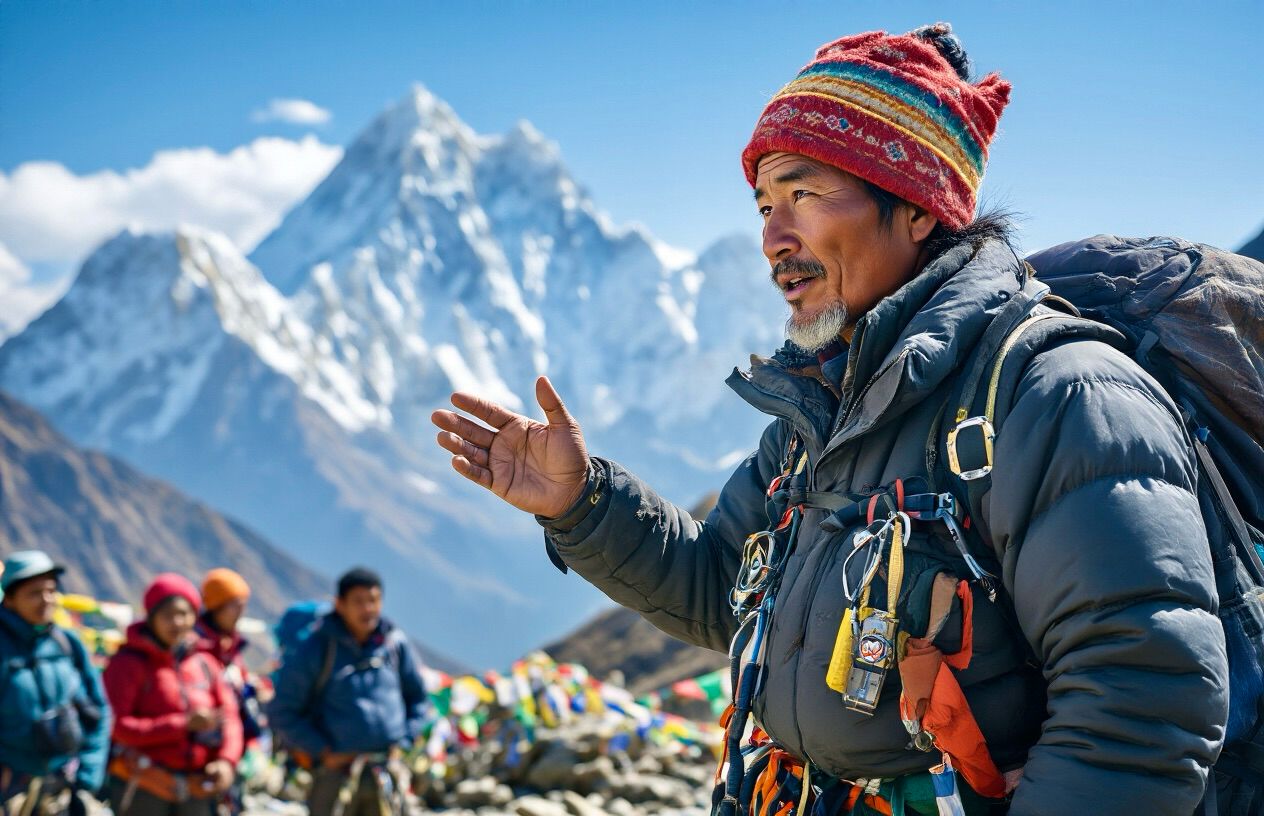
When climbing Island Peak while experiencing Nepal's cultural heritage, your safety is ensured by our team of experienced Sherpa guides. These skilled professionals provide essential expertise that makes a critical difference during your expedition. Their comprehensive knowledge includes:
- Expert navigation through challenging terrain
- Proper equipment handling and technical instruction
- Continuous assessment of climbing conditions
- Emergency response coordination when needed
Our Sherpa guides have extensive experience on Island Peak and the surrounding areas, making them invaluable resources for both the climbing and cultural aspects of your journey.
Altitude Sickness Prevention and Emergency Protocols
The threat of altitude-related illnesses is taken seriously throughout our expeditions. Our comprehensive approach includes:
- Carefully designed gradual acclimatization schedule
- Regular monitoring of symptoms and vital signs
- Daily health checks conducted by experienced guides
- Clear emergency protocols for immediate descent if necessary
These preventative measures significantly reduce the risk of serious altitude problems, allowing you to focus on both the climbing challenge and cultural experiences.
Weather Monitoring and Route Safety Assessment
Mountain weather can change rapidly, making continuous monitoring essential. Our safety system includes:
- Regular weather forecast checks and updates
- Real-time assessment of route conditions
- Authority to modify itineraries based on safety concerns
- Communication with other climbing teams and base operations
Our guides constantly evaluate potential hazards along the route, making informed decisions about when to proceed and when to wait for safer conditions.
Mandatory Travel Insurance and High-Altitude Coverage
To participate in our Island Peak expeditions, all climbers must obtain:
- Comprehensive travel insurance with specific high-altitude emergency coverage
- Policies that include helicopter evacuation from remote areas
- Medical coverage suitable for extreme environments
- Documentation verified before departure
Additionally, we strongly recommend carrying a personal first aid kit with basic medications and supplies for minor issues.
On technical climbing sections, our strict safety protocols must be followed without exception, ensuring a secure environment while you challenge yourself on this remarkable peak.
Beginner-Friendly Approach with Professional Support
No Prior Mountaineering Experience Required
Island Peak presents a unique opportunity for adventure enthusiasts without extensive mountaineering backgrounds. While having some prior experience can be beneficial, it's not a mandatory requirement for taking on this breathtaking climb. This accessibility makes Island Peak an excellent introduction to high-altitude mountaineering for those looking to venture beyond traditional trekking experiences.
Comprehensive Training and Skill Development
With our professional support system, novice climbers receive thorough training before attempting the summit. These comprehensive programs focus on developing essential mountaineering skills, including:
- Proper use of crampons for ice walking and climbing
- Ice axe techniques for stability and self-arrest
- Rope management and harness familiarization
- Ascending and descending using fixed ropes
- Basic snow and ice climbing techniques
These skill development sessions are conducted in a controlled environment, allowing climbers to practice and build confidence before tackling the actual mountain terrain.
Step-by-Step Guidance from Experienced Professionals
Throughout the entire expedition, our team of seasoned mountaineering guides provides constant support and instruction. These professionals:
- Demonstrate proper techniques in real-time
- Monitor climbers' form and provide immediate corrections
- Ensure safety protocols are followed at all times
- Offer personalized advice based on individual abilities
- Make critical decisions regarding weather and climbing conditions
This hands-on guidance creates a supportive learning environment where beginners can develop their skills while feeling secure in their progression.
High Success Rate with Proper Preparation and Support
With the combination of professional guidance, thorough preparation, and proper acclimatization, Island Peak boasts an impressive success rate of approximately 80-85% for climbers. This high achievement rate demonstrates that with the right support system:
- Physical preparation before the expedition pays dividends
- Gradual acclimatization during the approach trek significantly increases summit chances
- Professional guidance helps overcome technical challenges
- Mental preparation and encouragement from experienced guides boost confidence
The structured approach to climbing Island Peak has proven that beginners with determination and proper support can successfully reach this magnificent Himalayan summit, creating memories that will last a lifetime.
Booking and Customization Options
Flexible Itinerary Customization for Individual Needs
At Everest Sherpa Expeditions Pvt. Ltd., we understand that every adventurer has unique preferences and requirements. Our Island Peak with Cultural Tours packages can be tailored to fit your specific needs. Whether you wish to extend your stay in certain cultural sites, add extra acclimatization days, or incorporate specific religious ceremonies into your journey, our team can adjust the itinerary accordingly. This flexibility ensures that your Nepalese adventure aligns perfectly with your personal goals and interests.
Group Size Management and Personalized Service
We place significant emphasis on maintaining appropriate group sizes to enhance your experience. Smaller groups allow for more personalized attention from our experienced guides and create opportunities for deeper cultural immersion. For those seeking an even more exclusive experience, we offer private expedition options with dedicated support staff. Our personalized service extends to accommodating dietary restrictions, arranging special cultural interactions, and ensuring your comfort throughout the journey.
Optional Helicopter Return and Premium Services
Enhance your expedition with our premium service add-ons. One of our most popular options is the helicopter return service from Chhukung, which saves you several days of trekking on the return journey and provides spectacular aerial views of the Himalayan landscape. This option is particularly valuable for those with time constraints or who prefer to minimize physical exertion after the summit attempt. Additional premium services include private accommodations where available, upgraded meal options, and exclusive cultural experiences not included in standard packages.
Trusted Operator Booking Through Everest Sherpa Expeditions
Secure your adventure directly with Everest Sherpa Expeditions Pvt. Ltd., a trusted operator with extensive experience in combining mountaineering challenges with cultural explorations. Booking directly with us eliminates third-party complications and ensures clear communication throughout the planning process. Our dedicated booking team is available to answer all your questions, provide detailed information about the expedition, and guide you through the reservation process. With our established reputation and local expertise, you can confidently place your Nepalese adventure in our capable hands.
Conclusion
Combining Island Peak climbing with cultural tours in Nepal offers a perfect blend of adventure and immersion that few other experiences can match. Through this comprehensive journey, you'll challenge yourself physically on a 6,189-meter summit while also connecting deeply with Nepal's rich cultural heritage in Sherpa villages like Namche Bazaar and Tengboche. The well-structured itinerary ensures proper acclimatization, professional support, and safety throughout your expedition.
Whether you're a beginner mountaineer or an experienced climber, Everest Sherpa Expeditions provides customizable packages that balance technical climbing with meaningful cultural experiences. From $2,500-$4,500, your adventure includes everything needed for a successful summit attempt while also allowing time to appreciate the spiritual significance of the Himalayas. Book your Island Peak expedition during the optimal seasons (September-November or March-May) to experience clear mountain views, stable weather, and the profound satisfaction of conquering one of Nepal's most iconic trekking peaks while carrying home cultural memories that will last a lifetime.
If you need any further information, please contact us by email: [email protected], Phone: +977- 980 195 6248 (WhatsApp).
